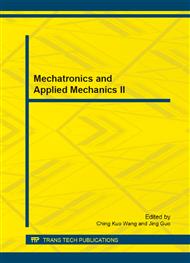[1]
K. J. Ästöm and T. Hägglund, PID Controllers: theory, design and tuning, Instrument Society of America, ISA, (1995).
Google Scholar
[2]
Zhongsheng Hou and Wenhu Huang, The Model-free Learning Adaptive Control of a Class of SISO Nonlinear Systems, Proceddings of the American Control Conference, Albuquerque, pp.343-344, (1997).
DOI: 10.1109/acc.1997.611815
Google Scholar
[3]
Zhongsheng Hou, C. Han and Wenhu Huang, The Model-free Learning Adaptive Control of a Class of MISO Nonlinear Discrete-time Systems, IFAC Low Cost Automation, Shenyang, P.R. China, pp.227-232, (1998).
DOI: 10.1016/s1474-6670(17)36391-7
Google Scholar
[4]
Zhongsheng Hou and Zhigang Han, Robust Modelless Learning Adaptive Control of Nonlinear Systems, Control and Decision, vol. 10, no. 2, pp.137-142, (1995).
Google Scholar
[5]
Tiezhu Zhang, Renxue Song and Zhigang Han, Universal Model Method of Linearization of Discrete Time Nonlinear System, Control and Decision, vol. 17, no. 2, pp.249-251, (2002).
Google Scholar
[6]
Lcandro dos Santos Coclho, Antonio Augusto Rodrigucs Coclho and Rodrigo R. Sumar, Model-free Learning Adaptive Controller with Neural Network Compensator and Differential Evolution Optimization, Proc. of the 2006 IEEE international Symposium on intelligent Control Munich, Germany, pp.2018-2023, (2006).
DOI: 10.1109/isic.2006.285646
Google Scholar
[7]
Leandro dos Santos Coelho and Fabio A. Guerra, Appling Particle Swarm Optimization to Adaptive Controller, Soft Computing in Industrial Applications, ASC39, pp.82-91, (2007).
DOI: 10.1007/978-3-540-70706-6_8
Google Scholar
[8]
Feng Ding and Tongwen Chen, Performance Analysis of Multi-innovation Gradient Type Identification Methods, Automatica, vol. 43, pp.1-14, (2007).
DOI: 10.1016/j.automatica.2006.07.024
Google Scholar
[9]
L. Ljung, System identification: Theory for the User (2nd ed. ), Englewood Cliffs, NJ: Pentice-Hall, (1999).
Google Scholar
[10]
Feng Ding, Tongwen Chen, Multi-innovation stochastic gradient identification methods. Proceedings of the sixth world congress on intelligent control and automation (WCICA2006), June 21-23, 2006, Dalian, China, pp.1501-1505.
DOI: 10.1109/wcica.2006.1712600
Google Scholar
[11]
Feng Ding, Tao Ding, Mean Square Convergence of Multi-innovation Projection Algorithm for Time-varying Multivariable Systems, journal of Hubei polytechnic university, vol. 16, no. 4, pp.16-20, (2001).
Google Scholar
[12]
Xiaolei Li, Zhijiang Shao and Jixin Qian, An Optimizing Method Based on Autonomous Animats: Fish-swarm Algorithm, Systems Engineering-theory & Practice, no. 11, pp.32-38, (2002).
Google Scholar
[13]
Xiaolei Li, Shaohui Feng, Jixin Qian and Fei Lu, Parameter Tuning Method of Robust PID Controller Based on Artificial Fish School Algorithm, Infromation and Control, Vol. 33, no. 1, pp.112-115, (2004).
Google Scholar
[14]
T. Wigren, Recursive prediction error identification using the nonlinear Wiener model, Automatica, vol. 29, no. 4, pp.1011-1025, (1993).
DOI: 10.1016/0005-1098(93)90103-z
Google Scholar


